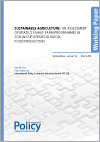
Land Grab in Africa: A Review of Emerging Issues and Implications for Policy Options
Resumo:Over the past decade, large-scale land acquisition in Africa has become quite intense, especially in DRC, Ethiopia, Madagascar, Mozambique, Sudan, Tanzania and Zambia. While African countries are motivated by the need to transform the agricultural sector and diversify their economies, the urge to meet the needs of future food and biofuel security, among others, underpins foreign interest. This divergence of interest makes the realisation of the prospective benefits elusive in Africa. Maximsing the benefits of large-scale land acquisition requires bold actions against the following structural impediments: (i) weak land governance and a failure to recognise, protect and properly compensate local communities’ land rights; (ii) lack of country capacity to process and manage large-scale investments; (iii) foreign investors’ proposals that are inconsistent with local and national visions; (iv) resource conflict with negative distributional and gender effects; and (vii) inadequate capacity to assess the social, economic and environmental impact of the project on local communities. This paper suggests a 10-point agenda for maximising the benefits of the land grab in Africa. (…)
Esta publicação também pode ser encontrada em um formato condensado e/ou expandido: